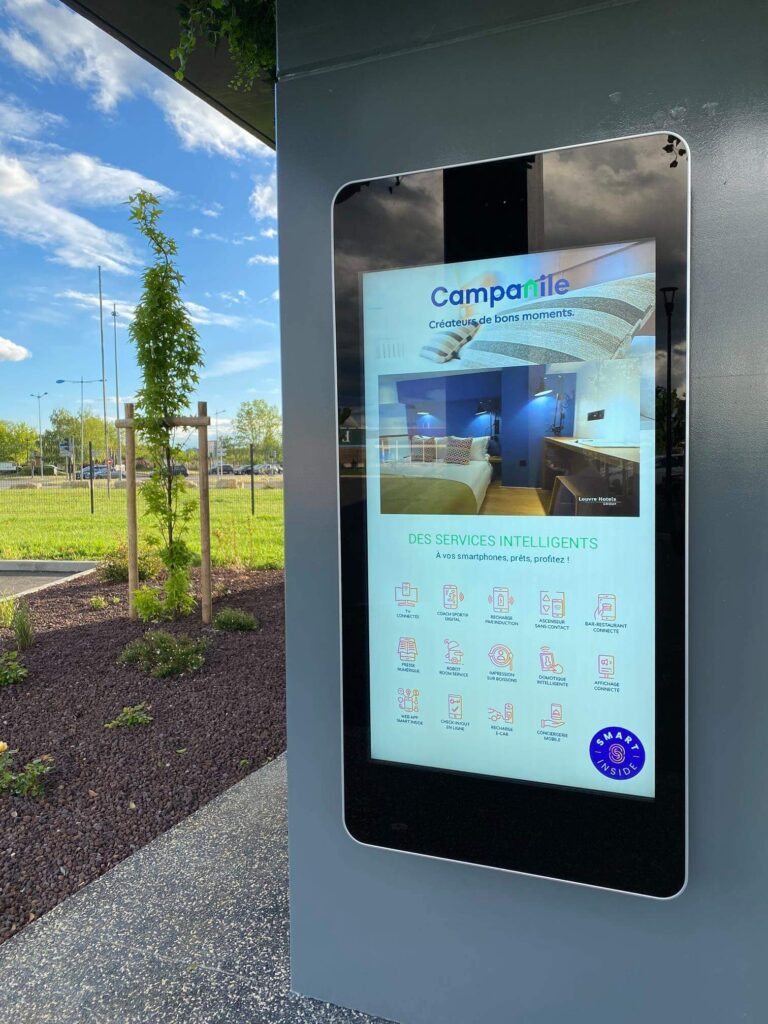Campanile Smart Lyon Est: Louvre Hotels Group has recently launched the first “Smart Inside” hotel in Europe, combining the Internet of Things (IoT) and innovative technologies to offer a unique experience for its guests.
Guests at Campanile Smart Lyon Est – Eurexpo Bron Aviation hotel have access to more than 20 innovations and can experience an enhanced stay. As Louvre Hotels Group explained, it launched its technological label in Europe at the heart of the Campanile Smart Lyon to develop a touchless experience and a 100% digital hotel infrastructure where robots serve customers. They can use innovative technologies for almost everything they do during their stay.
The hotel offers robot room service, whit highly sophisticated robots that transfer food or drinks directly to guests’ rooms. Guest can turn their smartphones into smart keys and lock or unlock their rooms, or even call the hotel’s lift or place an order. Within hotel rooms, every device is connected, and guests can control everything from their TV to the air conditioning or electricity in their room simply by using only their smartphones.
As PierreFrédéric Roulot, CEO of Louvre Hotels Group said, “this concept of the future has been created thanks to our intercultural collaboration between France and China. Through Jin Jiang GIC, we want to offer an innovative, sustainable, and connected product. After a big success in China, we are very proud to launch this new label for the European midscale segment”.

The Campanile Smart Hotel’s goal is to become the referential player in the sustainable city of Lyon, voted the European capital of sustainable and intelligent tourism back in 2019. As the company points out, “once inside their room, nothing is left to chance to create a custom-made experience. A robot who takes care of the room is available through the Web App to respond to all client’s needs through the online concierge service. Through the same channel, and for an optimal night, the traveler can also adjust the mood of the room, from the intensity of the lighting to the ambient temperature”.
How it works – Campanile Smart Lyon Est
In this “Smart Inside” hotel, located in Saint-Priest, the innovative technologies are centralized in a Web App, a light version of a classic application. Guests don’t need to download this app onto their phones since it is available everywhere and all the time on all connected devices.
According to the Louvre Hotels Group, the concept behind its technological label is simple: “it offers the client, should they wish, a hotel stay that is 100% digital, a touchless experience, smooth and quick”. That means it is up to each guest to choose whether they want to leave the specialized experience at any time to return to the classic experience with teams available to them.
The hotel’s reception is always available through the “Smart Inside” Web App. Guest can submit their requests using their smartphones and leave comments or ask questions. Guests can also use the smart room service, having a robot at their service. They need to request the Web App, and within a few minutes, a robot will pop up in front of their door having everything they asked for, such as drinks, food, or any other amenities.

Rooms are 100% connected, meaning that guests do not have to get out of their bed to change the lighting or the temperature of their room. They only need to open the Web App and click on one of the digital tools. The Web App is directly connected to devices such as the lighting switch or the smart TV via an internet connection and makes guest life easier.
The first “Smart Inside” hotel in Europe offers even more digital and touchless amenities to its guests. The customers can use the smart press service and download more than 7.000 newspapers and magazines in the Web App and access them during their stay or even after leaving the hotel. Guests have at their services a connected terminal as well, and they can check in or check out contactless by using their mobile phones.
Guests can use the same application to place an order at the hotel’s bar or restaurant, pay using their smartphone and have a robot deliver their order in front of their door. If their smartphone is compatible with induction charging, guests can use the hotel’s charging spots available in the client’s rooms and the hotel’s lounge bar. Users can even enjoy the so-called “smart drink” through the Web App. They can easily choose a message or design they want to see on their drinks, and a smart coffee printer machine does all the rest.
Within Campanile Smart Lyon Est facilities, there are QR codes associated with smart technology designed to provide a touchless and unique guest experience. Hotel customers can use their mobile phones to access the lifts. They can call the elevator via their mobile phone and choose the floor they are heading to directly from the Web App. The hotel offers smart car charges as well, where guests can quickly recharge their e-cars.
Data protection
When it comes to the Internet of Things, smart technology, and more specifically, the so-called “connected rooms” provided by many smart hotels around the world, the issue of the protection of visitors’ data is always under concern.
In the case of the first “Smart Inside” hotel in Europe, it is evident that users can have access to so many different innovations and digital experiences using their smartphones or any other devices. So, what about their data, and how Louvre Hotels Group ensures data protection and users’ privacy?

Guests to book their rooms or to use the “Smart Inside” Web App should provide some of their data, such as their names, email addresses, or their physical address, and also provide access to some technical data, such as their smartphone’s operating system or geological data, or even submit details about their credit cards or bank account credentials.
“Your privacy is important, and for this reason, we have implemented the necessary measures for protecting and minimizing the Personal Data that we collect about you and process for compliance with the new General Data Protection Regulation (hereinafter, “GDPR”) and the French Data Protection Act,” the Louvre Hotels Group notes and explains that “we mostly collect identification and contact data (first name, last name, email address, etc.), which allows us to identify you, to, among other things, better manage your bookings and the commercial relationship that we maintain with you, or more simply to be able to manage our Sites and your Guest Account. To provide you with customized offers, we also process data related to your interests based on your consumer data during your stay with us”.

Also, when hotel customers create a Guest Account or book a room, they can provide the Louvre Hotels Group with the necessary Personal Data via their Facebook account or Google account. “In this case, we become a recipient and data controller of this Personal Data regarding your booking or creation of a Guest Account. We will be able to carry out any request to exercise your rights. However, Facebook and Google remain responsible for processing your Personal Data for the purposes they determine on their behalf (e.g., managing your e-mail, managing your page, etc.). To obtain effective exercise of your rights regarding this part of your personal data processing, please refer to their privacy policy and contact them directly,” the company clarifies.



